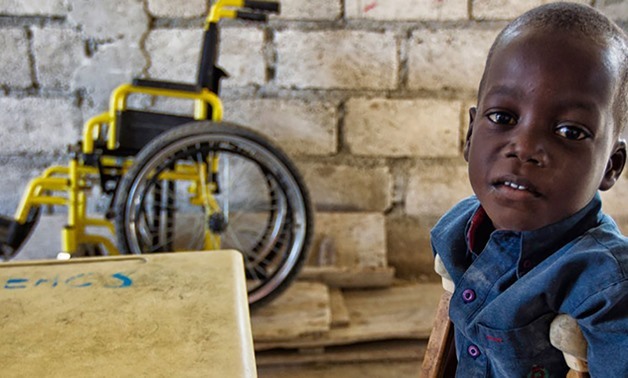
A young student at a school for disabled children in the poor neighborhood of Cité Soleil in Port-au-Prince, Haiti – UN Photo/Logan Abassi
CAIRO – 4 February 2018: The Social Solidarity Committee at the House of Representatives and other officials vowed Saturday to put the draft law supporting people with disabilities into effect.
This was during a celebration held Saturday for issuing a draft law for the disabled, attended by Minister of Transport Hesham Arafat and Minister of Higher Education Khaled Abdel-Ghaffar, along with other officials for the disabled.
The head of the Social Solidarity Committee, Abdel Hady Al-Kasaby, said that the draft law is a great victory for the absent rights of people with special needs to support 11 million families, stressing that the parliament will not accept the government’s non-compliance with implementing the law’s articles.
Kasaby confirmed that the committee contacted Minister of Social Solidarity Ghada Waly to put the executive regulations within six months for the law, confirming that if schools are not abiding by the law, their license will be withdrawn.
He confirmed that Article 81 ensures the full rights of the disabled in different fields to integrate them in society and implement equality and equal opportunity principles.
In this regard, Minister of Parliamentary Affairs Omar Marwan remarked that the current political leadership greatly cares for the disabled as President Abdel Fatah al-Sisi declares 2018 as a year for the disabled and people with special needs.
Minister of Transport Arafat said that the ministry will apply the law by forming highly qualified new road networks to prevent accidents causing disability, adding that the new road network that have been formed since 2014 has prevented 5,000 disable cases.
He further explained that the ministry has reduced the cost of metro tickets for people with special needs in addition to preparing the stations suitable for them as the ministry has rehabilitated all metro networks to facilitate their ride. He stressed that within three months the rehabilitation of railway and metro network for the disabled will be underway.
Furthermore, Minister of Higher Education Abdel-Ghaffar declared that international conference to integrate the disabled in the university’s community will be held at the end of February under Sisi’s sponsorship, and its outcomes will be applied in all Egyptian universities.
Head of the religious sector at the Egyptian Ministry of Awqaf Jaber Tayei referred that the Ministry of Awkaf has set plan to put the law into action to facilitate worship for the disabled and providing translators of religious speeches for them, explaining that the ministry hopes this would be part of Egypt’s culture and not simply an abided law.
The representative of the Ministry of Development, Mohammed Hegazy, concluded that the ministry will establish units for the disabled to follow up on the application of the law.
Egypt’s House of Representatives (Parliament) discussed on December 3, 2017, a draft law supporting people with disabilities in line with the United Nations (UN) standards to mainstream and apply a comprehensive development approach for people with disabilities.
The parliament’s discussion of the bill coincided with the International Day of Persons with Disabilities (IDPD). The UN Convention on the Right of Persons with Disabilities stipulates that persons with all types of disabilities must enjoy all human rights and fundamental freedoms.
The draft bill aims to better recognize the rights of people with disabilities, integrate them into society, provide them with proper living conditions and eliminate the disability-based discrimination. The majority of the lawmakers have approved an article that stipulates that academic universities shall allocate 10 percent of their on-campus houses for students with special needs.
There was a debate among te lawmakers on the name of the law. During the Parliament’s session, the majority rejected the proposal submitted to change the name of the bill to “The Rights of Persons with Disabilities and Dwarfs” and maintained its old title, “Draft Law on People with Disabilities and Special Needs” which was put forward by the Ministry of Solidarity along with the parliamentary Solidarity Committee in 2016.
Per the bill, people with disabilities will also be granted identification cards with many privileges such as shorter working hours for themselves or their careers in all governmental and nongovernmental institutions.
The disabled will also be provided with suitable housing and transportation services. Educational institutions shall give priority to the disabled, while governmental and financial institutions shall be better equipped to accommodate them and facilitate their access to services.
The state shall guarantee the health, economic, social, cultural, entertainment, sporting and education rights of dwarves and people with disabilities, as well as providing them with job opportunities, according to the draft bill. Article 80 of the constitution stipulates that “the state guarantees the rights of children who have disabilities and ensures their rehabilitation and incorporation into society."
The annual observance of the International Day of Disabled Persons was proclaimed in 1992 by United Nations General Assembly Resolution 47/3. It aims to promote the rights and well-being of persons with disabilities in all spheres of society and development, and to increase awareness on the conditions of persons with disabilities in every aspect of political, social, economic and cultural life, according to the United Nation.
The theme of the day in 2017 is “Transformation towards a sustainable and resilient society for all.”


Comments
Leave a Comment